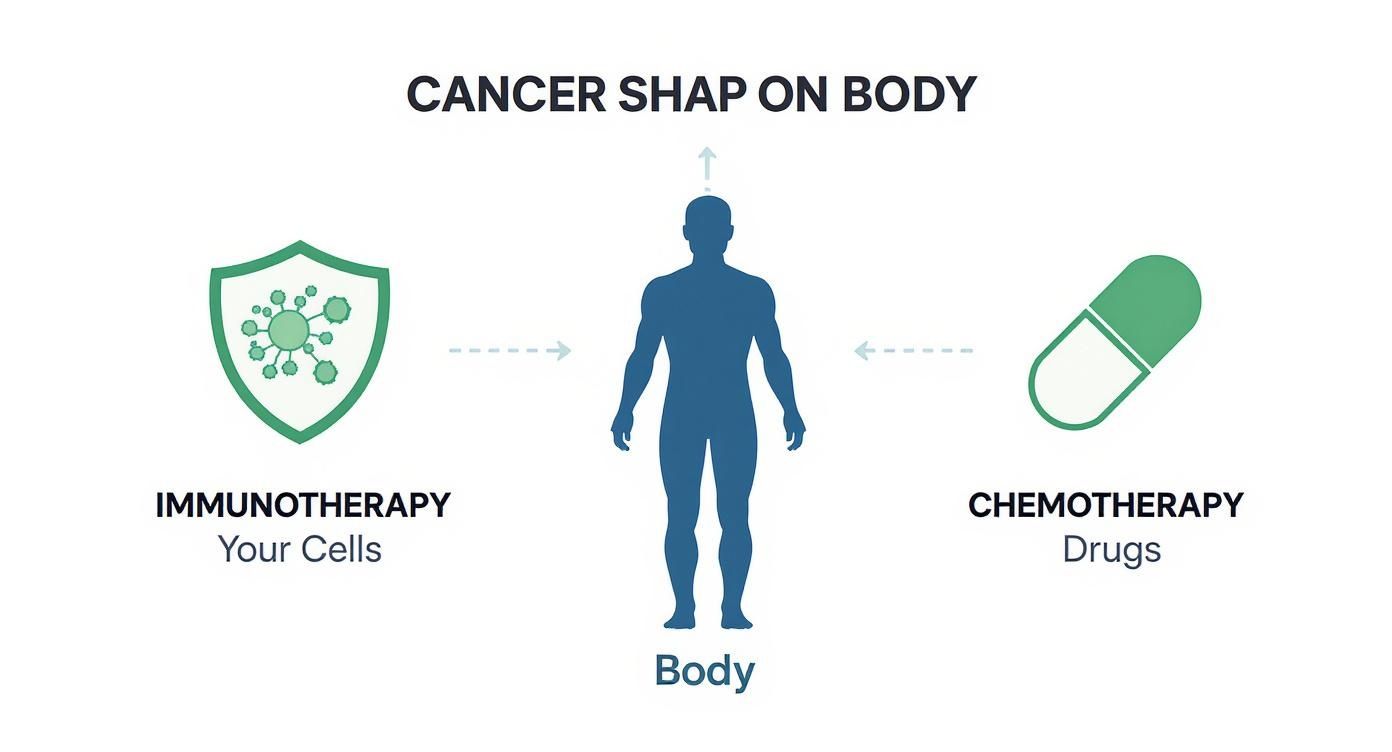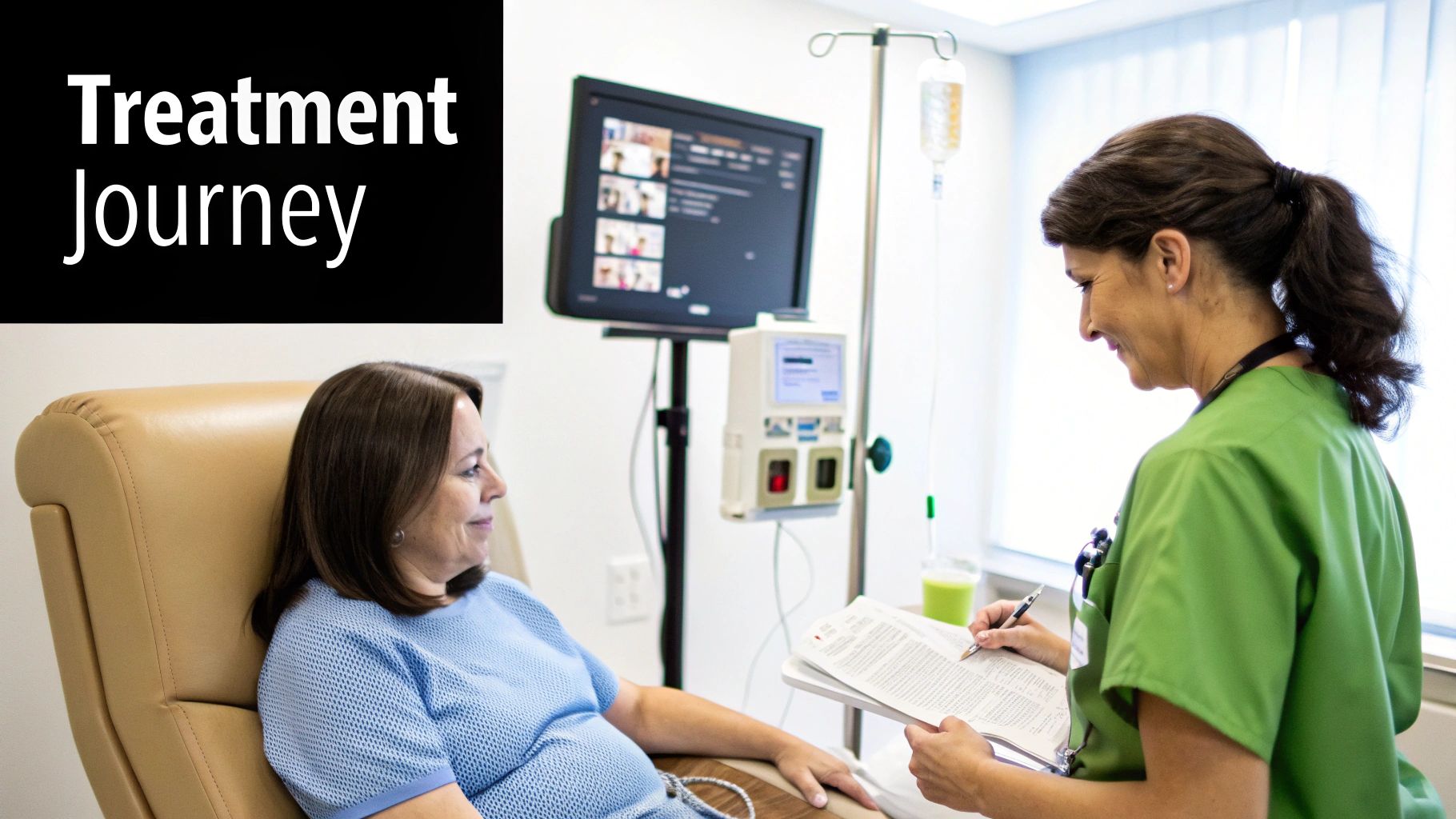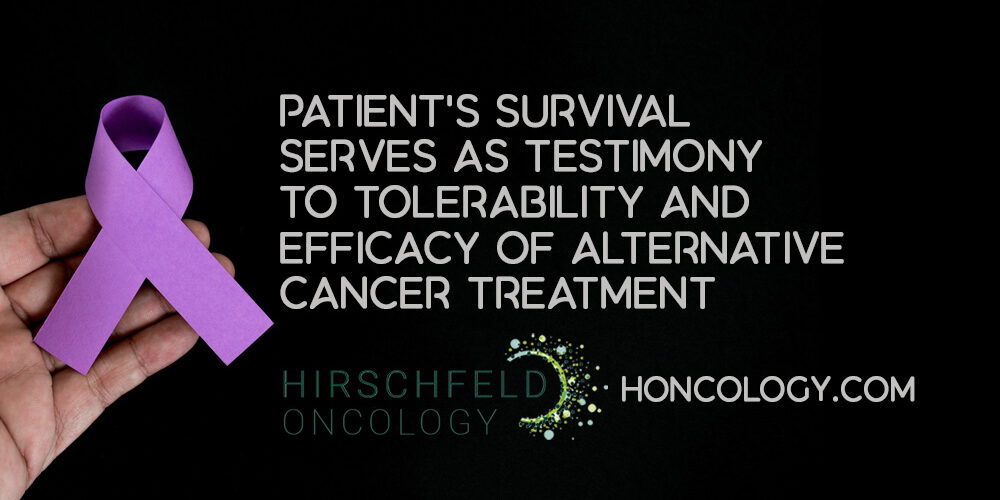Immunotherapy is a fundamentally different way of treating cancer. Instead of using outside forces like chemicals or radiation to attack tumors, it empowers your body's own immune system to do the job it was designed for: finding and eliminating dangerous cells.
Think of it as training your internal security system to recognize and fight cancer. This approach has quickly become one of the most important pillars of modern cancer care.
How Immunotherapy Teaches Your Body to Fight Cancer
Your immune system is like a highly sophisticated team of guards, constantly patrolling your body for threats like viruses, bacteria, and abnormal cells. It’s incredibly good at its job. But cancer cells are clever—they’re masters of disguise. They find ways to hide from these guards or even flip a switch that tells the immune system, "Nothing to see here, move along."
This is where immunotherapy steps in. It doesn't attack the cancer directly. Instead, it acts like a new training manual for your immune guards. It "re-educates" your immune cells, stripping away cancer's camouflage and giving them the tools they need to finally see the cancer for what it is: a dangerous intruder that needs to be destroyed.
By reactivating your immune system's natural abilities, immunotherapy helps your body launch a precise and powerful attack against cancer cells it had previously overlooked. It's this unique approach that makes it so effective.
A New Standard in Cancer Care
Not long ago, the idea of using a patient's own immune system to fight cancer was mostly experimental. Today, it's a primary, first-line treatment for many different types of cancer, a testament to how far our understanding of cancer biology has come. The results have been incredible for many patients.
The impact is clear. The global cancer immunotherapy market was valued at around USD 105.7 billion and is expected to grow to USD 254.6 billion by 2033. This massive investment reflects its clinical success and the intense research pushing it forward. You can read more about the growth of cancer immunotherapy to understand just how rapidly this field is evolving.
One of the biggest advantages of immunotherapy is its targeted action, which can often lead to a more manageable side effect profile compared to traditional treatments. To help you see the difference, let's compare it directly with chemotherapy.
Immunotherapy vs. Chemotherapy: A Quick Comparison
This table breaks down the fundamental differences between how immunotherapy and chemotherapy work. While both are powerful tools in oncology, their methods couldn't be more different.
Ultimately, immunotherapy represents a shift from attacking the disease from the outside to strengthening the body's ability to heal from within. This distinction is key to understanding its growing role in cancer treatment plans here at Hirschfeld Oncology and around the world.
Exploring The Main Types of Immunotherapy
Immunotherapy isn’t just one single treatment. Think of it as a whole new field of medicine, with a toolkit full of different strategies, each designed to empower your immune system in its own unique way. To really grasp what immunotherapy is, it helps to understand these different approaches. It’s like having various specialists on your body’s internal security team—each one with a specific skill for finding and neutralizing intruders.
This infographic shows the core difference between immunotherapy, which uses your own cells, and chemotherapy, which relies on external drugs.

As you can see, the power of immunotherapy truly comes from within. It’s all about leveraging your body's natural defenses to mount a smarter, more targeted fight. Let’s dive into the major types you might hear about.
To help you keep track, here’s a quick overview of the main immunotherapy approaches we'll cover.
Types of Immunotherapy and How They Work
Each of these therapies harnesses the immune system differently, offering new hope for many types of cancer.
Immune Checkpoint Inhibitors: Releasing The Brakes
Your immune system has natural "brakes," or checkpoints, that stop it from going into overdrive and attacking healthy cells. These checkpoints are proteins on your immune cells that need to be turned on or off to launch an attack.
Cancer cells are incredibly clever. They can hijack this system by producing proteins that slam on those brakes, effectively telling your immune cells to stand down and ignore the threat.
Immune checkpoint inhibitors are drugs that physically block this from happening. By releasing these safety brakes, they allow your T-cells to finally see and attack cancer cells that were hiding in plain sight. This approach has been a game-changer for treating cancers like melanoma and lung cancer.
CAR T-cell Therapy: Superhero Training for T-cells
Sometimes, T-cells don't just need a nudge—they need a complete upgrade. Chimeric Antigen Receptor (CAR) T-cell therapy is a highly personalized treatment that’s like sending your immune cells to a superhero training academy.
Here’s how this remarkable process works:
- Collecting Your T-cells: Doctors draw your blood and use a machine to separate out your T-cells.
- Genetic Re-engineering: In a specialized lab, these cells are genetically modified to produce new receptors called CARs. These receptors are custom-designed to lock onto specific proteins (antigens) found on your cancer cells.
- Growing and Infusing: The newly engineered CAR T-cells are grown into an army of millions and then infused back into your body.
- Seeking and Destroying: Now super-charged, these cells circulate through your body, hunt down, and launch a precise attack on any cell carrying their target antigen.
This "living drug" has shown incredible results, especially for certain blood cancers like leukemia and lymphoma.
CAR T-cell therapy essentially gives your immune cells a new GPS and a set of advanced weapons, enabling them to find and eliminate cancer with incredible precision. It turns your own cells into a powerful, targeted force.
Cancer Vaccines: A Training Manual for Your Immune System
When we hear "vaccine," we usually think of preventing a disease. Cancer treatment vaccines are different; they’re designed to treat cancer that already exists. They work like a training manual for your immune system, teaching it exactly what the enemy looks like.
These vaccines introduce a cancer-specific antigen into your body, safely exposing the immune system to a piece of the cancer. This prompts your body to build an army of T-cells prepared to recognize and attack any cells with that same antigen. While many are still being tested in clinical trials, this approach holds enormous promise for mobilizing a highly specific anti-cancer response.
Cytokines: The Battle Horns of The Immune Response
Cytokines are proteins that act as messengers for your immune system. Think of them as the battle horns that rally the troops, amplify communication between immune cells, and direct the overall attack.
In cancer treatment, we can administer lab-made versions of certain cytokines, like interleukins and interferons, to trigger a stronger and more widespread immune response against cancer. This strategy helps boost the number and activity of cancer-fighting immune cells circulating throughout your body.
Oncolytic Viruses: Smart Missiles That Reveal The Enemy
One of the most innovative strategies is oncolytic virus therapy. This treatment uses viruses—either naturally occurring or modified in a lab—that are programmed to do one thing: infect and kill cancer cells while leaving healthy cells alone.
When the virus gets inside a cancer cell and starts replicating, it causes the cell to burst and die. This is powerful for two reasons:
- It directly destroys the tumor cell.
- It releases cancer antigens that act like a flare, revealing the tumor's location to your entire immune system and triggering a secondary wave of attack.
It’s a two-pronged strategy that combines direct destruction with an alert system to call in reinforcements. This approach, while distinct, shares the same core principle of immunotherapy by activating the immune system. It's important to know this is different from other treatments that also target specific pathways in cells; you can learn more about those in our guide on targeted therapy.
What Cancers Respond Best to Immunotherapy
While the idea of using your own immune system to fight cancer is incredibly powerful, it isn’t a one-size-fits-all solution. The success of immunotherapy really hinges on the unique personality of a tumor—its location, its genetic wiring, and how it’s learned to hide from the immune system.
Think of it this way: some cancers are just naturally more "visible" to immune cells. They might be loaded with genetic mutations that create unusual proteins, essentially waving a red flag that says, "I don't belong here." These are the tumors that tend to respond exceptionally well when an immunotherapy drug takes the brakes off the immune system.
Because of this, immunotherapy has completely changed the game for several cancers that were once very difficult to treat, rewriting the standard of care and giving new hope to patients worldwide.
Cancers With High Immunotherapy Success Rates
A few cancers, in particular, have shown remarkable and lasting responses to immunotherapy, especially to immune checkpoint inhibitors. For many patients, these therapies have been truly life-changing.
Melanoma: This was one of the first and most dramatic success stories for immunotherapy. For patients with advanced melanoma, treatments like Keytruda (pembrolizumab) have produced long-term remissions that were almost unheard of just a decade ago. It turns out that melanoma cells often carry a high number of mutations, making them easy for a re-energized immune system to find and destroy.
Non-Small Cell Lung Cancer (NSCLC): Immunotherapy has moved to the front lines in treating NSCLC. Drugs like Opdivo (nivolumab) have significantly improved survival rates, especially for patients whose tumors are covered in a protein called PD-L1.
Kidney Cancer (Renal Cell Carcinoma): We’ve long known that kidney cancer is unusually sensitive to immune-based treatments. Checkpoint inhibitors have built on that knowledge and are now a cornerstone of care, used either on their own or with other targeted drugs to fight advanced disease.
Bladder Cancer: For people with advanced bladder cancer that has stopped responding to chemotherapy, immunotherapy has become an essential lifeline. It offers a powerful new way to control the disease and extend patients' lives.
This is just scratching the surface. At Hirschfeld Oncology, we are dedicated to staying on top of every new development. You can explore the cancers we treat to learn more about how we integrate these advanced therapies into our care plans.
The Role of Biomarkers in Guiding Treatment
So, how do we predict if immunotherapy will be a good fit for you? The answer often lies in biomarkers—specific molecular clues inside your tumor cells that can tell us how they might react to a treatment.
The most common biomarker we look for is PD-L1 expression. Remember, PD-L1 is the "don't attack me" signal that cancer cells use to shut down T-cells. If your tumor tissue shows high levels of PD-L1, it’s a strong sign that a drug designed to block that signal will work well.
Another key clue is the Tumor Mutational Burden (TMB). This is simply a measure of how many genetic mutations are found in your cancer cells. A high TMB means there are more abnormal proteins for your immune system to recognize as foreign invaders.
Testing for these biomarkers is a critical first step. It allows your care team to personalize your treatment plan, moving away from a one-size-fits-all approach and toward a strategy tailored to your tumor’s unique biology. This precision is key to maximizing the chances of success.
This field is moving incredibly fast. The U.S. Food and Drug Administration (FDA) has granted over 150 approvals for immunotherapy agents since 2011, with checkpoint inhibitors accounting for about 81% of them. This rapid adoption into everyday cancer care shows just how valuable these treatments have become. The constant progress makes biomarker testing more important than ever for matching the right patient to the right therapy at the right time.
Understanding and Managing Potential Side Effects

Unleashing your immune system against cancer is a game-changer, but it’s not without its own unique challenges. The side effects from immunotherapy are fundamentally different from what you might expect with chemotherapy. Instead of targeting fast-growing cells, these side effects pop up when your newly energized immune system gets a little too enthusiastic and mistakenly targets healthy tissue.
Imagine your body's security team suddenly becoming so hyper-aware that they start flagging friendly faces as potential threats. This can spark inflammation just about anywhere. The great news is that your oncology team is well-versed in spotting and managing these reactions.
Most of these immune-related issues are mild and manageable, especially if we catch them early. That’s why keeping an open line of communication with us here at Hirschfeld Oncology isn't just helpful—it’s the cornerstone of your treatment.
Common Side Effects Grouped by Body System
Because the immune system is everywhere, side effects can show up in different ways depending on where the inflammation occurs. They don't always appear right away, either; sometimes they develop weeks or even months into treatment, so staying vigilant is key. Here are the most common areas we see affected.
Skin: Your skin is often one of the first places to react. This can look like rashes, itching, blistering, or just general dryness. It's a classic sign of immune cells causing inflammation in the skin.
Digestive System: When the immune system targets the gut, it can cause colitis—an inflammation of the colon. The signs are typically diarrhea, cramping, or blood in the stool. This needs to be addressed quickly to keep it from getting worse.
Endocrine Glands: The glands that regulate your hormones (like the thyroid and pituitary) can also be affected. This might lead to fatigue, unexpected weight changes, or shifts in your mood. We monitor this with regular blood tests to stay ahead of any issues.
It's absolutely vital to report any new or worsening symptom to your doctor immediately, no matter how small it seems. Early action makes all the difference.
Proactive Management Is Key
Our number one job is to keep you safe and feeling as good as possible while the treatment does its work. If an immune-related side effect does appear, our first move is usually to prescribe medications that can gently dial back the immune response, such as corticosteroids (steroids).
Think of these steroids as a dimmer switch for your immune system. They turn down the intensity just enough to stop the attack on healthy cells, without turning off its ability to fight the cancer. In some cases, we might also pause your immunotherapy for a bit until the side effect is back under control.
The most powerful tool you have is your own voice. Reporting symptoms early allows your team to step in quickly, often with simple solutions that prevent a minor issue from escalating. You are our most important partner in your own care.
The investment in understanding what is immunotherapy for cancer is exploding. The U.S. market was valued at around USD 31.82 billion and is expected to more than double to USD 71.65 billion by 2033. This incredible flow of resources is driving research not just for more effective drugs, but for smarter, safer ways to manage their side effects. Discover more insights about the cancer immunotherapy market to see how this progress translates directly into better patient care.
What to Expect on Your Immunotherapy Journey

Starting a new cancer treatment can feel like stepping into the unknown. We find that knowing what the path ahead looks like can make all the difference, bringing a sense of clarity and control back to you. Your immunotherapy journey isn’t just a single appointment; it's a carefully planned process with clear stages, all managed by your dedicated oncology team. Think of it as a roadmap designed for you.
This journey actually starts well before you receive your first treatment. The first phase is all about thorough consultations and specialized testing to make absolutely sure immunotherapy is the right approach for you and your specific cancer. This upfront planning is key to personalizing your care right from the start.
The Initial Steps: Consultation and Testing
Your path begins with an in-depth conversation with your oncologist. This is our chance to sit down together, explore if immunotherapy is a solid option for you, and discuss what we hope to achieve. If it looks like a promising fit, we move on to biomarker testing.
Our team will take a small sample of the tumor tissue and analyze it for specific molecular "clues." We’re looking for things like PD-L1 expression or a high tumor mutational burden (TMB). These markers act like signposts, helping us predict how well your cancer is likely to respond to certain immunotherapy drugs. This data-driven approach means your treatment is matched directly to your tumor's unique biology.
The Treatment Process: Infusion and Scheduling
Once we’ve confirmed you’re a good candidate, you’ll begin the treatment itself. Most immunotherapies are given as an intravenous (IV) infusion here in our comfortable clinical setting. The medication is delivered directly into your bloodstream through a small, thin tube.
A typical treatment day is pretty straightforward:
- Check-in and Vitals: A nurse will get you settled and check your weight, blood pressure, and temperature.
- Blood Work: We’ll usually do a quick blood draw to make sure all your levels look good and your body is ready for treatment.
- IV Placement: The nurse will place the IV line, which is usually a quick and simple process.
- Infusion: The immunotherapy drug is administered. The infusion itself can take anywhere from 30 to 90 minutes, depending on the specific drug you're receiving.
The schedule for these appointments can vary quite a bit. Some patients come in every two weeks, while others might visit every three, four, or even six weeks. Your oncologist will map out the best schedule for you. The entire process of immunotherapy at Hirschfeld Oncology is designed to be as smooth and manageable as possible.
Monitoring Your Progress and Duration of Therapy
Throughout your treatment, your care team will be keeping a close eye on how both you and the cancer are responding. We use a combination of methods to get a full picture of your progress.
Your care team uses regular imaging scans, like CT or PET scans, to see if your tumors are shrinking or remaining stable. These scans, combined with blood tests, provide crucial feedback on whether the treatment is working as intended.
How long you’ll be on immunotherapy also varies from person to person. For some, treatment might last for a set number of cycles over one or two years. For others who are responding well with manageable side effects, therapy might continue longer to keep the cancer in check. Your oncologist will constantly evaluate how you're doing and adjust the plan as needed, making sure your treatment always aligns with your health and your goals.
Starting the Conversation: What to Ask Your Oncologist About Immunotherapy
Walking into an appointment to discuss cancer treatment can feel overwhelming. Having a good conversation with your oncologist is everything, and the best way to do that is to come prepared. Feeling empowered to ask questions helps you become a true partner in your own care.
Think of your oncologist as your most important guide on this journey. Asking clear questions helps you both map out the best path forward, making sure you understand the plan and feel confident in the decisions you make together.
To help you get that conversation started, we’ve put together some key questions. You might even want to print this list and bring it with you to your next appointment here at Hirschfeld Oncology.
Key Questions for Your Consultation
- Based on my specific cancer type and stage, could immunotherapy be a good option for me?
- What kind of tests, like for PD-L1 or tumor mutational burden (TMB), would we need to do to see if I’m a good candidate?
- What are the realistic benefits we’re hoping to achieve with this treatment?
- Let’s talk about side effects. What are the most common ones, and how would we manage them if they show up?
- How will we know if the immunotherapy is working? What tests will we do, and how often?
- Can you walk me through what the treatment schedule would look like? How long do people typically stay on this therapy?
Don't Forget to Ask About Clinical Trials
It's always a good idea to make sure you're looking at the complete picture. Sometimes, the most promising new treatments are available through clinical trials long before they become standard.
Be sure to ask this simple but powerful question: "Are there any immunotherapy clinical trials that I might be a good fit for?" This can open up new possibilities and ensures you’ve explored every single option.
These questions are just a starting point, of course. The goal is to open up a productive, collaborative discussion with your care team. Ultimately, you want to choose a treatment path that aligns with your health, your personal goals, and your quality of life.
Your Immunotherapy Questions, Answered
As you explore immunotherapy, it's completely normal to have a lot of questions. This is a complex topic, and we want to provide clear, straightforward answers to the things our patients ask most often. Our goal is to help you feel informed and confident about your treatment options.
How Is Immunotherapy Different from Chemotherapy?
The simplest way to think about it is this: chemotherapy is a direct assault on cancer, while immunotherapy is an indirect one.
Chemo uses powerful drugs to kill any cell that divides quickly. This works well against cancer, but it also hits healthy cells like those in your hair follicles or stomach lining, which is why it causes so many familiar side effects.
Immunotherapy, on the other hand, doesn't attack the cancer cells directly. Instead, it works by taking the brakes off your own immune system, essentially teaching it to recognize and fight the cancer on its own. It's less like a carpet bomb and more like training a highly specialized sniper.
How Long Until I See Results?
This is a big difference from chemotherapy. While chemo can sometimes shrink tumors very quickly, immunotherapy often needs more time to rev up. It might take several weeks, or even a couple of months, before we see a clear response.
This delay is expected. The treatment isn't just killing cells; it's building a sophisticated, long-term defense system. Patience is really important here, and your oncology team will be monitoring your progress every step of the way.
It's crucial to remember that a slow start doesn't mean the treatment is failing. Immunotherapy aims to create a lasting "memory" in your immune system, which is a gradual but powerful process.
Can Immunotherapy Actually Cure Cancer?
For some people, yes. We've seen incredible, durable remissions with immunotherapy, even in cancers that were once considered untreatable, like advanced melanoma. In these cases, the patient's immune system keeps the cancer in check for years, which many experts would call a functional cure.
However, a "cure" isn't the guaranteed outcome for everyone. For many other patients, immunotherapy can turn cancer into a manageable, chronic condition, controlling its growth over the long term. Its success really depends on the cancer type, the specific drug, and your individual biology.
What Is Pseudo-progression?
This is something that can be really scary if you aren't prepared for it. Sometimes, the first scan after starting immunotherapy shows that a tumor has actually grown. This is called pseudo-progression, and it's not what it looks like.
What's really happening is that your immune cells are flooding the tumor to attack it. This rush of activity causes inflammation and swelling, making the tumor appear larger on the scan, even while the cancer cells inside are being destroyed.
Your oncologist knows how to spot the signs of pseudo-progression versus true tumor growth. We typically won't make any decisions based on that first scan alone and will schedule another one a few weeks later to see what's really going on.
At Hirschfeld Oncology, we believe an informed patient is an empowered patient. If you have more questions about immunotherapy and whether it could be an option for you, we're here to help. Learn more about our approach and request a consultation today at https://honcology.com/blog.





.png)


.png)
.png)




